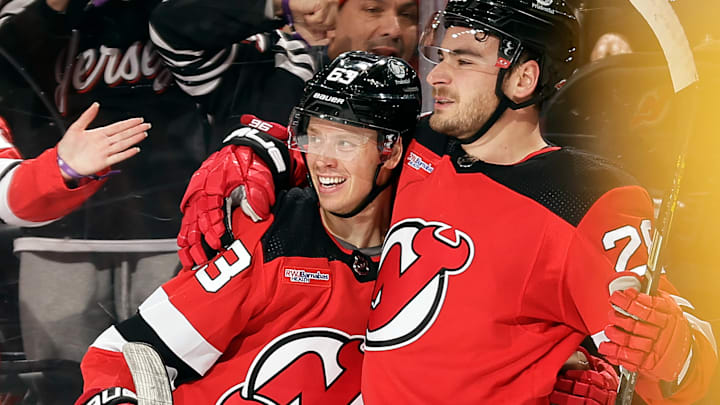We aren’t ones to disparage a mock trade here at Pucks and Pitchforks. We actually love the practice and do it ourselves. When done correctly, it really pushes the conversation forward about a player who is available beyond just “team A wants player B in hypothetical moment C.” This gives it a tangible understanding of what the fanbase is willing to give up (even if it’s often not enough).
So, take that into account when we say what we’re going to say next. Other fanbases don’t understand what the Devils will be looking for in big trades.
Obviously, the Devils have been and will continue to be in mock trades for Quinn Hughes. Some of the most popular trades include forward Dawson Mercer, defensemen Dougie Hamilton or Simon Nemec, and the best possible draft capital. Recently, with the possible Quinn Hughes trade coming back up again, a new name is being brought up in trade talks: Jesper Bratt.
Bratt was ranked as one of the best wingers in the NHL, and he really hit his stride last season. He’s been great for a while, but he hit a different echelon in 2024-25. He helped the Devils make the playoffs despite more injuries than we can count, including to Bratt’s centerman Jack Hughes.
And there lies the problem. The Devils can’t afford to trade Bratt for a defenseman, even if it’s one of the best defensemen in the league. They’d have nothing left in the forward group outside their top two centers.
Another proposed trade was Martin Necas of the Colorado Avalanche for Timo Meier. We understand the trade in a vacuum. Meier hasn’t played up to his name value in New Jersey, and he’s signed for close to $9 million per season. Necas hasn’t loved his time in Colorado, and he’s facing a free agency decision soon.
This trade is much worse than the Hughes-Bratt one, as the Devils would not only lose a cost-controlled asset for one with contract question marks, but Meier’s ceiling is higher than Necas’s, and he’s had a 40-goal season under his belt, while Necas’s career high is 28.
But even if the Devils are trading Timo Meier for Jason Robertson, it’s fixing one problem and creating another. The Devils are one top-six winger short. Trading one of their two top-six wingers just puts them back to where they are one top-six winger short. If they traded Bratt or Meier for Quinn Hughes, then they are two top-six wingers short.
While there are trades where the Devils need to give up something of serious value, they can’t make their team worse or even just make a change to get a small increase. It’s the same place they are now, which is not a Stanley Cup contender without serious development from their forward group.
They can wait until a team tanks and makes their star wingers available, and the Devils can trade picks and prospects to make it happen. Trading Bratt or Meier doesn’t make much sense at this point.
